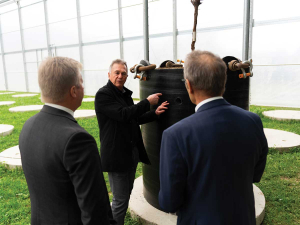Science system shakeup ‘to maximise investment value’
Reaction to the Government’s major overhaul of the country’s seven crown research organisations has so far been largely positive.
 Dr Damian Martin shows Minister of Agriculture Todd McClay and Kaikōura MP Stuart Smith the facility.
Dr Damian Martin shows Minister of Agriculture Todd McClay and Kaikōura MP Stuart Smith the facility.
A new experimental facility in Blenheim will help grape growers adapt to the changing climate.
Te Whenua Tupu, the Living Lab, was launched in late July at the New Zealand Wine Centre Te Pokapū Wāina in Marlborough. It will allow researchers to study the effect of the environment, both above and below the soil, on growth and development of plants, and develop tools and technologies to help future-proof the horticultural sector.
“The changing climate adds new challenges to the horticultural sector in New Zealand and globally, and finding new ways to grow crops is vital to future-proof the sector,” says Dr Damian Martin, Science Group Leader Viticulture and Oenology at Plant & Food Research. “This new facility allows us to understand how environment influences the growth of plants down to the cellular level, and helps us develop new tools and technologies to grow our crops in existing or new regions.”
The Living Lab is based in a 600m2 shelter with space for 48 full-size potted plants to be grown and studied in a highly-instrumented, highly controlled environment. The facility also includes covered outdoor education spaces, which will support training of students, growers and industry representatives in new growing techniques.
Research Snapshots
This dynamic series of research presentations from organisations within the New Zealand Wine Centre – Nelson Marlborough Institute of Technology, Plant & Food Research, and Bragato Research Institute – is designed to provide quick and insightful snapshots of key findings, methodologies, and potential implications of research being undertaken by the Wine Centre’s research community. Each session is dedicated to a specific theme. Remaining sessions for 2024 are August 26, September 30, October 28 and November 25, from 1.30 to 3pm. Contact Stewart Field (This email address is being protected from spambots. You need JavaScript enabled to view it.) to be put on the mailing list.
A system that combines UV-C light for disinfection could provide chemical free treatment of plant pathogens and diseases such as…
Huntress, Novum, and The Marlborist embody an evolution of small producers in New Zealand.
Ben Leen never tires of the view at Amisfield, where audacious guinea fowl strut the grounds against a backdrop of…